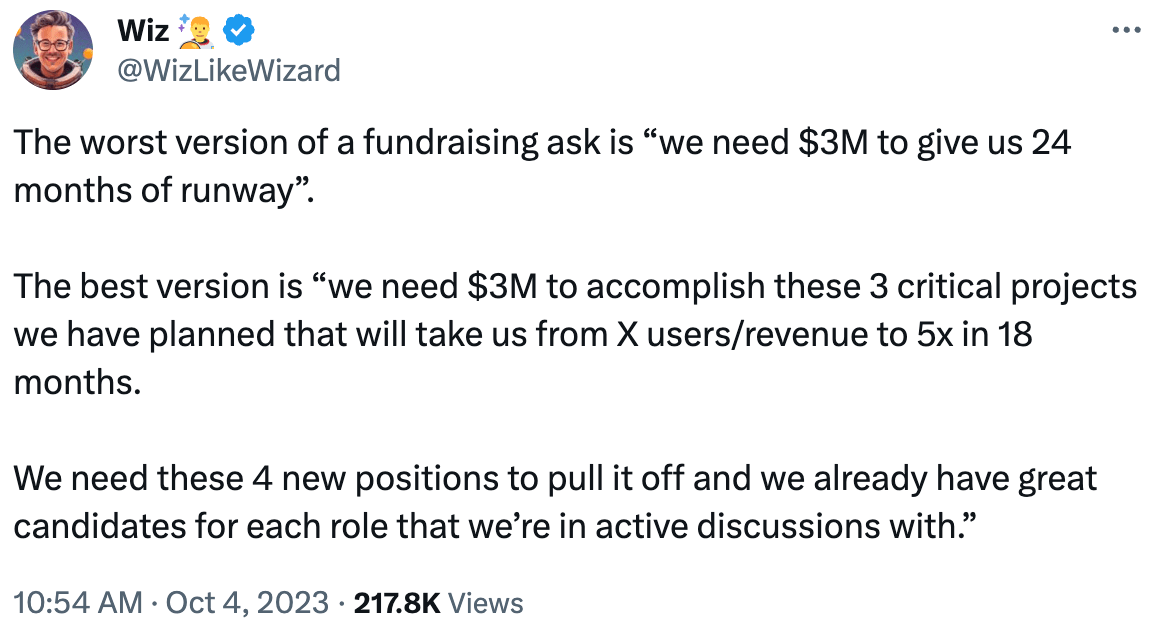I just announced a few new community meetups — and this week we’re hosting three in Miami, Austin, and Toronto! RSVP here:
Today at a glance:
Opportunity → Creator Coaching Platform
Framework → Single-threaded Ownership
Tool → Funnelytics
Trend → Pet Advice
Quote → How to Ask VC’s for Money

💡 Opportunity: Creator Coaching Platform
Alex Lieberman (the co-founder of Morning Brew) recently shared 8 ideas he said he’d actually look to start if he was able to find the right cofounder.
In general, he’s always openly sharing interesting ideas on X. I like this one because I’ve seen the power of effective mentorship firsthand. One of the most valuable parts of my founder journey has been the ability to get clarity when I need it from folks who are just 1 or 2 steps further along in their own journeys.
Two-sided marketplaces are some of the toughest businesses to build but because of that they’re also the hardest to compete with. This idea is basically an unbundling of the a16z-backed Intro, but with additional creator-specific features to allow mentors and mentees to show off and find each other via their existing content, rather than just credentials.
The creator economy is still growing and in all likelihood will continue to as people look for individuals to trust for their information online rather than existing institutions. I’m so bullish on this space that my new product Megaphone helps creators monetize their audience. And Alex’s idea is a great way for creators to monetize their knowledge.
🧠 Framework: Single-Threaded Ownership
Startups are chaotic and one of the hardest parts for team members to manage is the mental switching costs that happen when they’re going back and forth between projects.
Single-threaded ownership is a way to mitigate that — it’s an organizational design philosophy created at Amazon where individuals within a company are only responsible for one initiative at a time and directly manage all team members and resources required by the initiative. They also fully control the pace and scope of the project.
Typically it’s most effective when implemented at the leadership level in big orgs, but for startups it’s a powerful idea to use for every team member. For example, if you’re building a UI and a backend system with two engineers, make one fully responsible for each.
When a decision maker has competing priorities it often slows everything down. David Limp, a SVP at Amazon, says “The best way to fail at inventing something is to make it somebody’s part-time job.”
At Amazon, this manifests in two ways - a single-threaded owner (STO) and single-threaded leader (STL). With the STO model, the owner controls everything about the initiative. With the STL model the leader works across disciplines to drive the initiative but does not control the resources required for delivery.

🛠 Tool: Funnelytics
Setting up traditional analytics tools is a pain, but without them you can't fully optimize your customer journey.
Funnelytics Performance whiteboard provides actionable insights swiftly, saving time on data compilation and reporting. And they're offering a 14-day free trial with a 25% discount for all Houck's Newsletter readers. Just use the code HOUCK25 when you sign up.*

💬 Quote: How to Ask VC’s for Money
When an investor asks you why you need to raise money, the worst thing you can reply with is that it’s to extend your runway.
Investors care about growth and having a clear set of milestones you think you can hit. They see a lot of opportunities, and the most exciting ones are fires that are already growing that they can throw gasoline on top of.
This is similar to how your customer doesn’t care about your product, they care about the benefit or transformation your product provides for them.
Show them an opportunity that’s growing quickly but could grow faster with some help, rather than one that needs more money to survive a little longer in the hopes of striking gold.
🔗 Houck’s Picks
Upgrade for the full batch of picks this week:
10 lessons on early stage startup sales
Lessons learned from Loom’s growth from an idea to $975M exit
Signals of true product-market fit for startups
A unique principle for startup marketing

💡 How I Can Help
❤️ Upgrade to get all my weekly deep dives and founder community access
📣 Let me grow your startup faster by getting your content in front of 7.5 million people
💰 Fundraising? I’m sending monthly emails to hundreds of investors in my personal network highlighting exciting deals
💼 Hiring? I partnered with top creators to launch a boutique recruiting service
🤝 Grab time with me for a 1:1 session or a full-day sprint
🚀 Advertise in my newsletter to get in front of 80,000+ founders

“*” indicates sponsored content.



